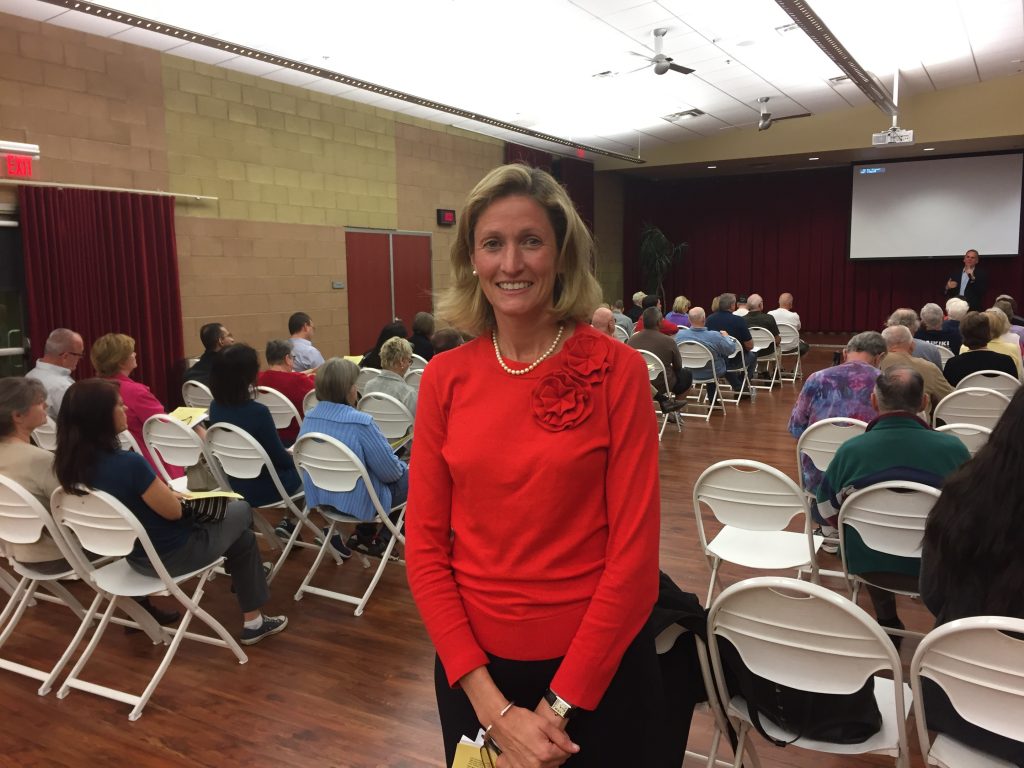
By Joyce Coronel
Summit conferences typically draw international leaders to discuss serious policy matters, but Tumbleweed Recreation Center in Chandler was the scene of a similarly weighty confab that examined critical issues of a different sort, but on an admittedly smaller scale.
The Chandler Homeowners Association Summit drew about 90 residents from West Chandler and other areas across the city, many of whom sit on HOA boards that deal with everything from parking no-no’s to unsightly weeds and non-payment of dues. Issues like crime trends and police activity were also addressed.
The city recruited attorney and HOA expert Beth Mulcahy to update residents on pending legislation that could affect their communities. She also gave attendees some tips about how to deal with difficult neighbors.
Mayor Jay Tibshraeny opened the evening by remarking on the “spectacular attendance” the HOA summits regularly attract, year after year.
“These meetings are an investment on our part to make Chandler a better city,” Tibshraeny said. “I have placed a strong emphasis on neighborhoods.”
Sean Duggan, chief of police for Chandler, who spoke at the summit in 2016, returned to apprise the group of changes that have occurred since then, including enhanced technology that has allowed his department to protect citizens better.
“This meeting has a special place in my heart because it’s one of the first presentations I made three years ago as a newly appointed chief,” Duggan said. He spoke of the partnership between the department and Chandler Fashion Center that now allows police to access the more than 90 cameras distributed around the mall, allowing officers to have information in real time. Previously, Duggan noted, the department was getting this intelligence second- or third-hand.
“It’s an incredible enhancement to security,” Duggan said. “If there is an active disturbance, our dispatch (staff) now have access to those cameras so our officers know what they are getting into.”
Another important aspect to community safety, he noted, was the cooperation between police and citizens. “There is no successful department in the country that doesn’t have the support of the people who live and work there,” Duggan said.
Mulcahy, an attorney whose firm represents more than 1,500 HOAs, said she’s partnered with Chandler for the last five years to educate homeowners, adding that she “absolutely loves” her work. “It’s really fun helping associations solve problems so we can build great communities.”
She said she gets what it’s like to serve on an HOA board, particularly since she was recently elected treasurer of the one in her own neighborhood.
Mulcahy’s presentation focused on pending legislation at the state capitol that deals with HOAs and the bills that recently went into effect.
Short-term rentals, she said, are a hot topic right now, and a new rule that became law last month holds that a city, town or county may not restrict the use of vacation rentals or short-term rentals.
“For associations, if your city or town had an ordinance that previously indicated that short-term rentals were prohibited in certain areas, this state law now trumps that,” Mulcahy said. “That means you have to rely on your documents to regulate it.” HOAs could also consider amending their documents, but it’s not an easy process, she said.
“Get online and look in your association and see how many short-term rentals you currently have—you might be surprised to see you already have a lot,” Mulcahy said, adding that she recommends taking a wait-and-see approach. “Many of the associations we are working with are having a harmonious relationships.”
Other new laws Mulcahy discussed included imposition of HOA late fees, absentee ballots and the amending of HOA documents in condominium communities.
Hundreds of bills are up for consideration at the state legislature, but Mulcahy zeroed in on the ones having to do with HOAs.
Senate Bill SB1113 deals with synthetic turf and states that HOAs would no longer be able to prohibit it. Another deals with parking on city streets and rules that HOAs would no longer be able to restrict it.
The cities usually have more relaxed parking rules, Mulcahy said, adding that she doubts the measure will pass. Another measure, SB 1400, was termed “worrisome” by Mulcahy. The bill deals with the foreclosure and lien process that HOAs must go through. At press time, the bill was still in committee.
Mulcahy advised those in attendance to keep the lines of communication open with neighbors.
“The most effective boards communicate all the time with their owners,” she said.
“I always worry when board members receive a records request and they are doing everything they can to not give the records.
“If you want a good association with a strong sense of community, have good communication.”


After owning home both inside and outside HOA’s, I can see the draw why City governments like HOA’s…It give the cities a single, actionable entity to manipulate, threaten or sue which controls hundreds of homeowners.